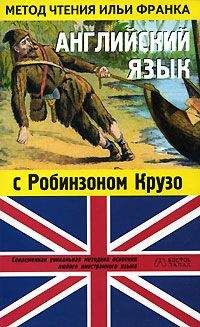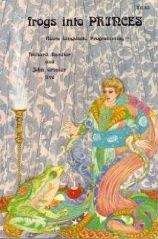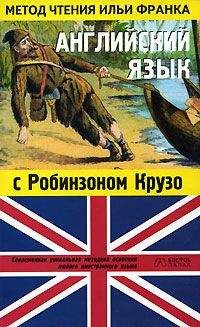I felt quite sure they were Spaniards (я был вполне уверен, что они были испанцами), and I had a great mind to go over (и имел большое намерение/желание отправиться туда; to go over — переходить /на другую сторону/; пойти, сходить /в какое-л. место, находящееся на некотором расстоянии/), if I could (если смогу), and join them (и присоединиться к ним). Indeed, my whole mind was set on seeing some of my own people again (в самом деле, весь мой ум был настроен увидеть некоторых из моих соотечественников опять; mind — ум; душевное состояние; намерение, желание).
I thought that if I could only get to the mainland (я подумал, что если бы я только смог добраться до материка), I would find some way to reach England (я бы нашел какой-либо способ достичь Англии), or at least some place where Englishmen lived (или, по крайне мере, какого-либо места, где жили англичане).
At last I told Friday (наконец я сказал Пятнице) that I would give him a boat to go back to his own country (что я дам ему лодку, чтобы он вернулся в свою страну). This was part of my plan for getting away from the island (это было частью моего замысла ухода с этого острова).
I took him over to the other side of the island and showed him my canoe (я отвел его на другую сторону острова и показал ему мое каноэ; to take — брать; доставлять; сопровождать; провожать; вести; брать с собой).
We cleared it of water (мы очистили его от воды) and then took a short sail in it (а затем сделали небольшое /водное/ путешествие на ней). Friday could paddle very well (Пятница мог грести веслом очень хорошо).
"Now, Friday (а теперь, Пятница)," I said, "shall we paddle across the sea to your own country (поплывем через море в твою страну)?"
He looked very dull at my saying this (он выглядел очень понурым, когда я это сказал; dull — незаточенный, тупой; тупой, глупый; тусклый; понурый, унылый, безрадостный, грустный), and I saw that he thought the canoe was too small (и я видел, что он думал, что каноэ слишко маленькое).
"Well (хорошо)," I said, "I have a bigger boat (у меня есть лодка побольше). I will show it to you to-morrow (я покажу ее тебе завтра)."
The next morning, therefore (на следующее утро, таким образом; therefore — поэтому, следовательно), I took him to see the first boat I had made (я отвел его посмотреть на первую лодку, которую я сделал) and which I could not get to the water (и которую я не мог доставить к воде = дотащить до воды).
He said it was big enough (он сказал, что она довольно большая). But it had been lying on the ground for twenty-three years (но она пролежала на земле двадцать три года) and was rotten (и была прогнившей; rotten — гнилой, прогнивший; to rot — гнить).
"We will make a new boat, Friday (мы сделаем новую лодку, Пятница)," I said. "We will make one as big as this (мы сделаем такую же большую /лодку/, как эта). Then you shall go to your old home in it (затем ты сможешь поплыть в ней на родину: «в свой старый дом»)."
He looked very sad (он выглядел очень грустным).
"Why are you angry with Friday (почему ты сердит на Пятницу; anger — гнев; раздражение)?" he asked (спросил он). "What has he done (что он сделал)?"
I told him that I was not angry (я сказал ему, что я не сердит), and asked him what he meant (и спросил его, что он имел в виду).
"Not angry! not angry!" he cried (воскликнул он). "Then why do you want to send Friday away to his old home (тогда почему ты хочешь отправить Пятницу в его старый дом)?"
"Why, Friday (как почему, Пятница)," I said, "didn't you say that you wished you were there (разве ты не говорил, что хочешь, чтобы ты был там = оказаться там)?"
"Yes, yes," said he. "Friday wishes both were there, but not Friday without his master (Пятница хочет, чтобы оба были там, но не Пятница без своего хозяина)."
"But what would I do there (но что я буду там делать)?" I asked. "I could do nothing (я ничего не могу делать)."
"Oh, yes, master," he answered very quickly (ответил он очень быстро = тут же), "You could do much (ты многое можешь сделать). You could teach wild mans to be tame (ты можешь научить дикарей быть смирными; tame — прирученный, одомашненный; укрощенный /о животных/; послушный, податливый, уступчивый), to know God (узнать Бога), to live right (жить правильно). You could do much."
"No, Friday," I said. "You shall go without me (ты должен отправиться без меня). Leave me here to live by myself (оставь меня здесь жить наедине с самим собой/одному) as I did before (как я жил ранее)."
He looked very sad (он выглядел очень грустным). Then all at once he ran and picked up a hatchet (затем совершенно неожиданно он побежал и подхватил топорик). He brought it and gave it to me (он принес его и дал мне).
"What shall I do with this (что мне с этим делать)?" I asked.
"You take it (ты бери его). Kill Friday (убей Пятницу)," he said.
"Indeed (в самом деле = ну и ну)," I said, "and why shall I do that (а зачем я должен это сделать)?"
"Then why do you send Friday away (тогда почему ты отправляешь Пятницу прочь)?" he said "Better kill than send away (лучше убить, чем отправлять)."
The tears stood in his eyes as he spoke (слезы стояли в его глазах, когда он говорил). I saw that he loved me and would always stand by me (я увидел, что он любит меня и всегда будет помогать мне; to stand by — присутствовать; защищать, помогать, поддерживать: «стоять при/возле»).
So I told him that I would never, never send him away, and that he should always stay with me (поэтому я сказал ему, что я никогда, никогда не отошлю его, и что он навсегда останется со мной).
You should have seen his eyes brighten (вам следовало бы увидеть, как прояснились его глаза; to brighten — прояснять/ся/; наполнять/ся/ радостью; bright — яркий; блестящий; светящийся; радостный, сияющий от счастья).
pity [ˈpɪtɪ], amazed [ǝˈmeɪzd], language [ˈlæŋɡwɪʤ], pleasure [ˈpleʒǝ], history [ˈhɪst(ǝ)rɪ], South [ˈsauƟ], Spaniard [ˈspænjǝd], dull [dʌl]
I TEACH FRIDAY MANY THINGS
WHEN my man Friday had been with me three days I took him out hunting.
As we were going through some woods, I saw a wild goat lying under a tree with two young kids sitting by her. I caught hold of Friday. "Stop," I said. "Stand still."
Then I took aim at one of the kids, shot and killed it.
The noise of the gun so frightened the poor savage that he did not know what to do. He shook like a leaf. He thought that I was going to kill him.
He did not see the kid I had shot. He threw himself at my feet. Although I could not understand a word he said, yet I knew that he was begging me to have pity on him.
And indeed I did pity him — he was so frightened.
I took him by the hand and lifted him up. I laughed at him and pointed to the kid that I had killed. When he saw it and understood me, he ran to fetch it.
Going on through the woods, I saw a big bird sitting on a tree. I thought it was a hawk.
"See there, Friday!" I said, as I pointed to it.
Bang! went my gun. The bird fell to the ground. It was not a hawk, but a parrot.
Friday was amazed. He looked at the gun and trembled.
For a long time he would not touch a gun. He would look at it and talk to it. He would say, in his own language: "O wonderful thing! Do not kill me! Do not kill me!"
We found nothing more in the woods that day. Friday carried the kid home, and I took off its skin and dressed it. Then I stewed some of the best pieces and made some good broth.
At dinner I gave some of the broth to my man. He liked it very well, but he could not bear salt in it.
I tried to show him that food was best with a little salt. But he did not think so, and he would never eat meat that was salted.
The next day I set Friday to work. I had him thrash some barley for me and grind the grains into meal as I had always done.
He did his work very well.
Then I let him see me make some bread and bake it. He learned very fast and soon could cook and keep house as well as any one.
Little by little I taught him how to work on my farm. We fenced another field and sowed more barley. For now there were two mouths to feed instead of one.
Very soon Friday learned to talk quite well. He learned the name of everything he saw. He was very quick, and I took pleasure in teaching him.
I told him all about gunpowder and guns and showed him how to shoot. I gave him a knife, which pleased him not a little. I made him a belt and gave him a hatchet to carry in it.
I told him about the countries on the other side of the great ocean. And I told him something of my own history.
Little by little I explained how my people traded in great ships, and how my own ship had been wrecked on the coast of this island.
Thus, between working and teaching, I forgot all my fears. The days passed by, and every day brought some new delight.
It was the pleasantest year of my life.
I often asked my man Friday to tell me about his own country. He told me all that he knew, and his words made me feel quite sure that the mainland of South America was not far away.
In fact, the low shore that I could see far to the west of my island was part of the coast of that great continent.
Friday told me that white men sometimes went there. He said that they had long, dark beards and were always trying to trade with his people.
I felt quite sure they were Spaniards, and I had a great mind to go over, if I could, and join them. Indeed, my whole mind was set on seeing some of my own people again.
I thought that if I could only get to the mainland, I would find some way to reach England, or at least some place where Englishmen lived.
At last I told Friday that I would give him a boat to go back to his own country. This was part of my plan for getting away from the island.
I took him over to the other side of the island and showed him my canoe.
We cleared it of water and then took a short sail in it. Friday could paddle very well.
"Now, Friday," I said, "shall we paddle across the sea to your own country?"
He looked very dull at my saying this, and I saw that he thought the canoe was too small.
"Well," I said, "I have a bigger boat. I will show it to you to-morrow."
The next morning, therefore, I took him to see the first boat I had made and which I could not get to the water.
He said it was big enough. But it had been lying on the ground for twenty-three years and was rotten.
"We will make a new boat, Friday," I said. "We will make one as big as this. Then you shall go to your old home in it."
He looked very sad.
"Why are you angry with Friday?" he asked. "What has he done?"
I told him that I was not angry, and asked him what he meant.
"Not angry! not angry!" he cried. "Then why do you want to send Friday away to his old home?"
"Why, Friday," I said, "didn't you say that you wished you were there?"
"Yes, yes," said he. "Friday wishes both were there, but not Friday without his master."
"But what would I do there?" I asked. "I could do nothing."
"Oh, yes, master," he answered very quickly, "You could do much. You could teach wild mans to be tame, to know God, to live right. You could do much."
"No, Friday," I said. "You shall go without me. Leave me here to live by myself as I did before."





